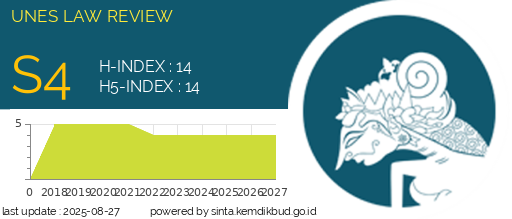Prinsip Kepastian Hukum Pengesahan Perjanjian Perkawinan Oleh Notaris Pasca Putusan Mahkamah Konstitusi RI Nomor 69/PUU/XIII/2015
DOI:
https://doi.org/10.31933/unesrev.v6i2.1471Keywords:
Deed, Marriage Agreement, Notary, Constitutional Court DecisionAbstract
The Constitutional Court's involvement of the notary profession in approving marriage agreements without the support of technical regulations regarding the legal mechanism of such agreements has led to normative conflicts, created legal uncertainties, and has the potential to harm husbands and wives who enter into marriage agreements. This situation involves informal changes in legislation and the absence of legal provisions regulating the notary's authority. The issues arising include juridical aspects related to the notary's authority, legal certainty issues, and sociological aspects related to the legality of marriage agreements not recognized by notaries. In this context, this research aims to examine whether the notary's authority to approve marriage agreements, as per the Constitutional Court Decision, is not contrary to the principle of legal certainty and how the understanding of the meaning of marriage agreements for objects other than marital property. The research findings indicate that the new authority granted by the Constitutional Court Decision No. 69/PUU/XII/2015 is an attribution-based authority derived from legislation. In other words, notaries obtain authority directly from the wording of Article 29 paragraph (1) of the Marriage Law. Article 29 paragraph (1) of the Marriage Law after the Constitutional Court Decision No. 69/PUU/XII/2015 stipulates that marriage agreements can be made before, during, and throughout the marriage with a written agreement certified by the Marriage Registrar or Notary. Although marriage agreements with objects other than marital property are not explicitly regulated, they are implicitly addressed, essentially governing family relationships. The existence of marriage agreements with objects other than marital property aims to protect and provide benefits to the parties involved in case of disputes.
Downloads
References
Ahmad Sainul, 2018, “Konsep Perjanjian Perkawinan Di Indonesia,” Jurnal El-Qanuny, 4(1)
Damanhuri, 2007, Segi Hukum Perjanjian Perkawinan Harta Bersama, Mandar Maju, Bandung,.
Damanhuri, 2012, Segi-Segi Hukum Perjanjian Perkawinan Harta Bersama, Mandar Maju, Bandung,.
Eva Dwinopati, 2017, “Implikasi Dan Akibat Hukum Putusan Mahkamah Konstitusi Nomor 69/PUU/XIII/2015 Terhadap Pembuatan Akta Perjanjian Perkawinan Setelah Kawin Yang Dibuat Di Hadapan Notaris”, Uniersitas Islam Indonesia, Yogyakarta,.
Fhauzi Prasetyawan, 2018, “Peran Notaris Terkait Pengesahan Perjanjian Perkawinan Pasca Putusan Mahkamah Konstitusi Nomor 69/PUU-XIII/2015,” Justitia Jurnal Hukum, 2(1).
Firman Floranta Adonara, 2020, “Kewenangan Notaris Mengesahkan Perjanjian Kawin Sebagai Amanat Konstitusi”, Jurnal Ilmu Kenotariatan, 1(2).
Indroharto, 1994, Usaha Memahami Undang-Undang Tentang Peradilan Tata Usaha Negara, Buku 1, Pustaka Sinar Harapan, Jakarta,
M. Yahya Harahap, 2005, Hukum Perkawinan Nasional Berdasarkan UndangUndang No. 1 Tahun 1974, Peraturan Pemerintah No. 9 Tahun 1975, Zahi Trading, Medan,.
Moh. Ali Wafa, 2018, Hukum Perkawinan Di Indonesia Sebuah Kajian Dalam Hukum Islam Dan Hukum Materil, YASMI, Tangerang,.
Oly Viana Agustinee, 2017, “Politik Hukum Perjanjian Perkawinan Pasca Putusan Mahkamah Konstitusi Nomor 69/PUU-XIII/2015 Dalam Menciptakan Keharomonisan Perkawinan”, Jurnal Rechtsvinding, 6(1),
R. Febrina Andarina Zaharnik, 2022, “Akibat Legalitas Perjanjian Perkawinan (HUWDLIJKSE VOORWAARDEN),” Kodifikasi, 4(1).
Downloads
Published
How to Cite
Issue
Section
License
Hak cipta :
Penulis yang mempublikasikan manuskripnya di jurnal ini menyetujui ketentuan berikut:
- Hak cipta pada setiap artikel adalah milik penulis.
- Penulis mengakui bahwa UNES Law Review berhak menjadi yang pertama menerbitkan dengan lisensi Creative Commons Attribution 4.0 International (Attribution 4.0 International CC BY 4.0) .
- Penulis dapat mengirimkan artikel secara terpisah, mengatur distribusi non-eksklusif manuskrip yang telah diterbitkan dalam jurnal ini ke versi lain (misalnya, dikirim ke repositori institusi penulis, publikasi ke dalam buku, dll.), dengan mengakui bahwa manuskrip telah diterbitkan pertama kali di Jurnal UNES Law Review.



















